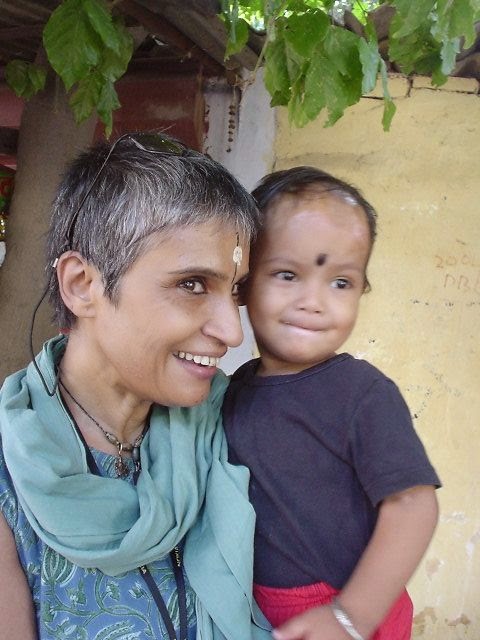Dispassion is a gift not given to all, certainly not to me. I found this turn of phrase in the personal histories column of last weeks Tehelka magazine. The piece is entitled How Does One Deal With So Much Suffering Every Day. This is a question I ask myself day after day and having been doing so for as long as I can remember. The author, a young student cruise out: Every day, we encounter tragedies that by all means should tear us apart emotionally. However, confronted by these happenings, we sigh, we sympathise, we pray for those in distress — sometimes we even help them in our small ways — and then we just continue with our atomised, quotidian lives, moved yet unaffected. It disturbed me how we all seemed to live like islands in impervious bubbles, which pain and sorrow would touch, but never invade. The problem with me is that it has more than invaded me. I have lived with this feeling since I was barely 3. Human suffering has always disturbed me and still does every time I step out of the house.
For the author the human tendency to forget and heal is not a character flaw. Nor is it a virtue. It is a survival tactic. I guess when you are young you are able to forget easily and heal faster. This tactic does not work for me. Actually it never has as I feel the same knot in my gut each time I recall the dancing bear that my grandmother lovingly invited to ‘treat’ her only grandchild. What she did was open the eyes of my heart.
I wrote about this incident some time back. I share it again.
The big bear has just finished the last of his antics. The noose around its snout ensured he did not step out of line. The owner in his tattered and threadbare clothes stands proudly hoping to get a good take. The house is imposing; its inmates look rich.
It is a chilly morning in this small Indian town. A watery sun is trying to break through the late morning mist. The grandmother has specially arranged the show for her 3 year- old grand daughter who has come from across many seas. She gets up and gives the man a few notes. A lot for a simple bear show in times when a few coins bought a lot of ware.
The man still wants to try his luck.
“It is very cold, Memsahib, would you be kind enough to give me an old coat”
The grandmother knowing the game smiles and tells him to go. The man insists. The grandmother raises her voice and repeats her words. The game goes on for a while till the man realises he will get no more and packs up his ware, urges his bear to move on and walks out of the gate.
As everyone gets off the rope chairs that had been laid out in the veranda for the performance a loud wail is heard:
“You are all very mean, you have so many coats hanging in your cupboards and you could not give the man one”
It is the little girl who has been watching the show from a corner, a tad frightened by the huge animal. Maybe she saw much more than the simple antics of the performing bear.
The grandmother and all present try to reason with her and tell her that the man has got a lot of money and must be happy. But the little girl refuses to be quietened and goes on crying and repeating her now almost incoherent pleas.
The grandfather who had remained in his office now comes out to find out what is happening. The little girl is still saying in between wrecking sobs:” you have so many, why did you not give him one”.
The grandfather somehow sees beyond the words and simply asks his wife to find a coat and send the house servant on bicycle to find the man and give him the coat.
Only when the servant comes back and tells all present that the coat has been given does the little girl stop crying.
The year is 1955, the small town Meerut. The little girl was me!
I am still the girl who said: ” you have so many, why did you not give him one”. I cannot begin to understand why those who have plenty do not feel the need to help another. I have been shocked beyond words at the callousness and the kind of reasons for not giving that I have had to hear. I recently cakes across a person who could sponsor project why without it making a difference to his lifestyle, a person I took to see the children in their homes hoping that would open his heart, but no way. It did not affect him at all. All it did was made me mad!
The young author of the article I mentioned in the beginning quotes a passage from Neil Gaiman’s book American Gods that freed her of the guilt of not feeling lasting pain. Gaiman writes: “No man, proclaimed Donne, is an island, and he was wrong. If we were not islands, we would be lost, drowned in each other’s tragedies. We draw lines around moments of pain, and remain upon our islands, and they cannot hurt us. They are covered with a smooth, safe, nacreous layer to let them slip, pearl-like from our souls, without real pain.”
I pondered on these lines for a long time wondering how you draw lines around pain and remain on islands and cover our pain with safe layers, however nacreous. If that were so, than the bear story could have been recalled without the hollow feeling in my gut. Maybe I am the odd one but I am who I am and like what I see.
These is how the author ends her piece: Human suffering is limitless. If you see what I see, you’d realise, it is limitless. We expose a tiny fraction of our hearts to it, and yet we get burnt. If we could expose all of ourselves to it and feel its true immensity, it would cripple us. We would never be able to do our jobs. Dispassion — it is a gift.
Dispassion is a gift but not for me!





